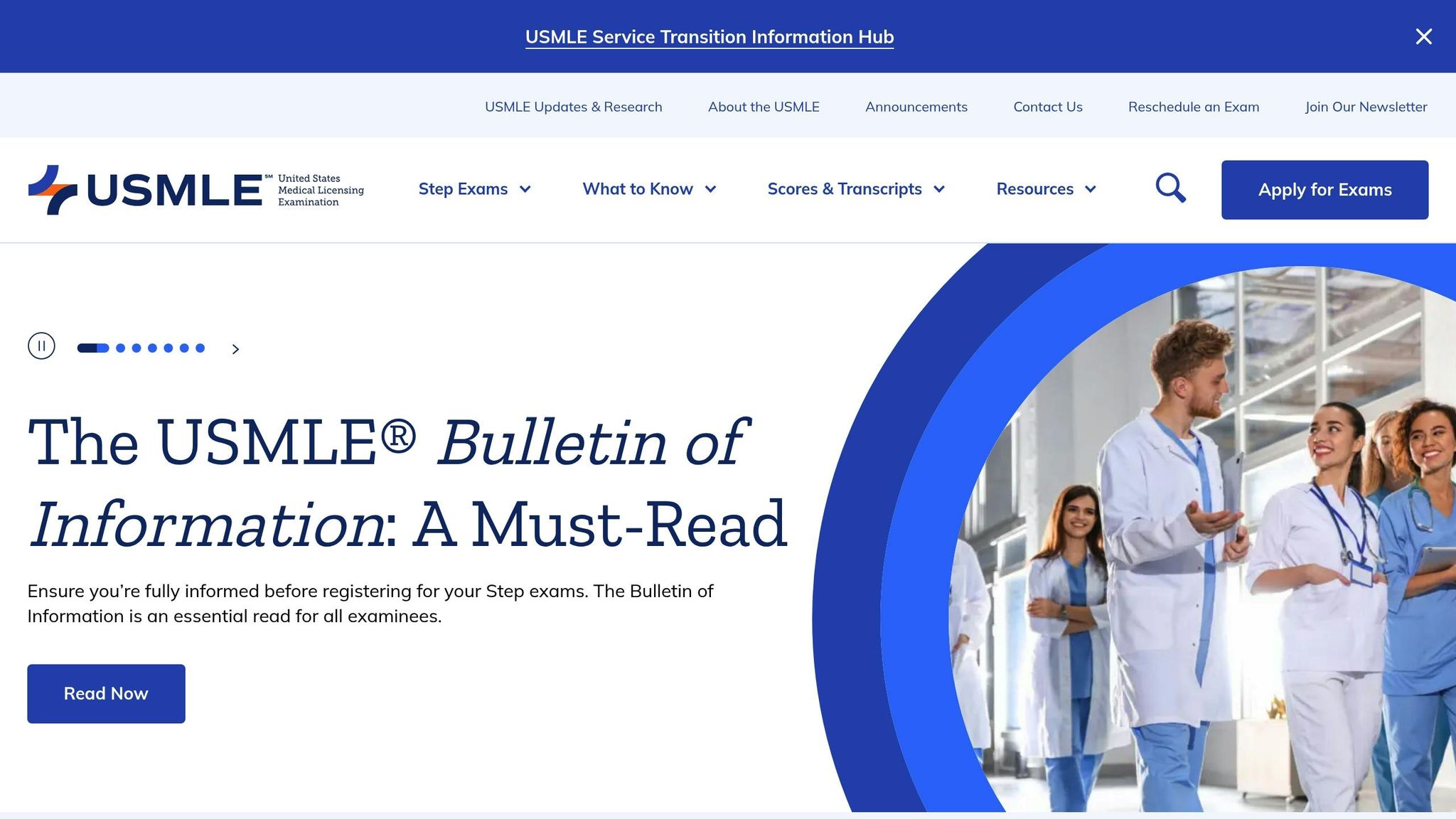Ultimate Guide to U.S. Medical Licensing for Foreign Doctors

To get a U.S. medical license as a foreign doctor, you need to follow these main steps:
- Get ECFMG Certification: Verify your medical education and credentials through the Educational Commission for Foreign Medical Graduates (ECFMG). This includes submitting your diploma, transcripts, and paying a $150 fee. Processing takes 3–4 months.
- Pass USMLE Exams: Complete the three-part United States Medical Licensing Examination (USMLE):
- Step 1: Basic sciences ($975)
- Step 2 CK: Clinical knowledge ($975)
- Step 3: Clinical management ($895)
- Complete a U.S. Residency: Apply through ERAS and secure a position in an ACGME-accredited program. Training lasts 3–7 years depending on your specialty.
- Apply for a State Medical License: Submit your ECFMG certificate, USMLE scores, residency completion certificate, and other documents to the state medical board. Some states may require fingerprinting or additional exams.
- Plan Your Relocation: Use services like MOD24 to simplify moving logistics.
Each step requires careful preparation, and timelines can vary. Start early, stay organized, and focus on meeting all requirements.
USMLE Pathway for International Medical Graduates | Step-by ...

Credential Evaluation Process
The first formal step in the process is obtaining ECFMG certification. The Educational Commission for Foreign Medical Graduates (ECFMG) ensures your medical education aligns with U.S. standards by conducting a detailed review of your credentials.
Here’s what the ECFMG certification process typically looks like:
- Submit required documents: Provide your medical diploma and final transcripts, including certified English translations.
- Pay the fee: As of April 2025, the evaluation fee is $150.
- Verification by ECFMG: ECFMG directly contacts your medical school to confirm your credentials.
- School accreditation check: ECFMG verifies that your medical school meets the necessary accreditation standards.
- Identity verification: Complete all required steps to confirm your identity.
- Certification status: Processing usually takes 3–4 months.
All documents must be either original or notarized copies. ECFMG has strict guidelines for verifying authenticity and works directly with your medical school to confirm the validity of your credentials. Be sure to keep copies of everything you submit and monitor your application through ECFMG’s online portal.
Once you’ve earned your ECFMG certification, you’ll be ready to move on to the USMLE exams, which we’ll cover next.
Medical Licensing Exams
Once you’ve earned your ECFMG certification, the next step is completing the three-part exam series designed to evaluate your knowledge in basic sciences, clinical reasoning, and patient care. These are the required USMLE Steps:
- Step 1: Focuses on basic sciences, is a one-day computer-based exam, and costs approximately $975.
- Step 2 CK: Tests clinical knowledge, is also a one-day computer-based exam, and costs around $975.
- Step 3: Covers clinical management, spans two days, and costs about $895.
You’ll need to register for these exams through the ECFMG portal during the designated registration periods. Scoring above the minimum thresholds set by state medical boards is essential, as strong USMLE scores can enhance your residency applications. High scores improve your chances of securing interviews and boost your overall competitiveness in the residency match process.
Next, we’ll dive into the residency application process and how your USMLE performance and ECFMG certification play a role.
sbb-itb-290b89d
Residency Requirements
Once you have your USMLE results, the next step is securing a residency to meet your state’s clinical training requirements. Your ECFMG certification and USMLE scores are crucial for entering the residency match process.
Residency Application Process
Residency applications are handled through the Electronic Residency Application Service (ERAS). Here’s what you need to know:
- Submit your ERAS application, which includes your personal statement, letters of recommendation, and USMLE transcripts. Don’t forget to register with the National Resident Matching Program (NRMP).
- Key requirements include ECFMG certification, passing USMLE Steps 1 and 2 CK, three letters of recommendation, clinical experience, a Dean’s Letter, and your personal statement.
- Interviews take place from October to January. By mid-February, you’ll rank your preferred programs, and match results are released in mid-March.
State Residency Rules
State medical boards require hands-on training, and only programs accredited by the Accreditation Council for Graduate Medical Education (ACGME) count toward licensing. Training in non-accredited programs won’t meet the requirements.
Training Duration by Specialty:
- Primary care: 3 years
- Surgery: 5–7 years
- Subspecialties: Add 1–3 years for fellowships
State-Specific Requirements:
- ACGME-accredited training is mandatory.
- Some states require portions of training to be completed in-state or impose additional supervision for international medical graduates (IMGs). Check with the relevant state medical board for details.
Residency positions can be highly competitive for IMGs. Focus on programs with a track record of accepting IMGs and consider applying to a wide range of programs.
Once you finish your residency, you can move forward with your state license applications.
State Medical License Application
Once you've finished your residency and have your USMLE scores, it's time to apply for your state medical license. Here's how to get started:
Document Preparation
Your ECFMG certificate and USMLE transcripts are the foundation of your application. You'll also need:
- Your residency completion certificate
- Medical school transcripts
- Letters of recommendation from program directors
Application Submission
To apply, you'll need to:
- Fill out the state board's online application
- Upload or mail required documents, including passport photos
- Pay the application fee
Additional State-Specific Requirements
Some states may require extra steps, such as:
- Fingerprinting and a criminal background check
- Passing a state-specific ethics or jurisprudence exam
- Attending an in-person interview with board members
Keep an eye on your application status online and respond quickly to any questions from the board. Once you're licensed, stay on top of renewal deadlines and complete your required CME credits.
Relocation Planning
Once you've secured your state license, it's time to plan your move. Professional moving services can make this process smoother, and MOD24 offers tools to help you focus on your career transition instead of the logistics.
Simplify Your Move with MOD24

MOD24 makes comparing licensed movers easy. You can get instant, upfront quotes and book online in just a few minutes. Plus, their premium support can assist with schedule changes. For added perks, consider the VIP membership ($49/year, with the first year free), which includes:
- A $200 discount on cross-country moves
- One month of free storage
- $100 protection for electronics
- 20% off packing supplies
- Access to a dedicated concierge service
Getting Ready for Your Move
- Declutter and plan: Get rid of items you don’t need, measure your new space, and create a floor plan.
- Pack carefully: Take apart large furniture, wrap fragile items securely, and label boxes with room names and handling instructions.
- Coordinate logistics: Complete your MOD24 booking, confirm schedules, and stay connected with your mover and support team.
Conclusion
To obtain U.S. medical licensure, you'll need to achieve ECFMG certification, pass USMLE Steps 1–3, complete a residency, and apply to a state medical board. Breaking this journey into clear, manageable phases can help you stay organized and focused.
Use this guide to keep your progress on track and maintain steady momentum.
Next Steps
Here’s how to move forward with your licensure process:
- Prepare documents for ECFMG verification: Ensure all required materials are ready for submission.
- Set a study plan for USMLE Steps 1–3: Dedicate specific times to prepare for each exam.
- Research IMG-friendly residency programs: Factor in licensing requirements, cost of living, and local opportunities.
- Plan your relocation with MOD24: Compare quotes, schedule guaranteed arrival times, and access premium support services for a smoother transition.

Questions to Ask About Communication Before Hiring Movers
When hiring movers, clear communication is critical to avoid stress and misunderstandings during yo...

Tips for Stress-Free Apartment Moving
Are you excited about moving? Although you’re moving to a better place, thanks to a huge pay raise, ...

Checklist for Using Machinery Skates Safely
Want to move heavy equipment without accidents? Here's how to use machinery skates safely: Inspect...